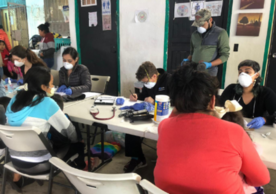
About two years ago, Yale School of Nursing lecturer in nursing Dr. Ronica Mukerjee ’17 DNP, FNP-BC, MsA, LAc, AAHIVS learned that caravans of migrant workers were being detained or turned away in Tijuana, Mexico. Mukerjee took only enough time to fundraise for medications before booking a flight.
“I didn’t know anybody there, but I just felt like I could show up and there would be people to take care of, and there was,” she said. Once in Mexico, Mukerjee met other like-minded providers and now works with the Refugee Health Alliance, a collectively run medical organization that Mukerjee co-founded and currently co-directs.
“I’m very passionate about the idea that people who do migrant labor and are from war-torn or cartel-torn or environmentally degraded countries deserve to have the same access to resources that the rest of the world has,” Mukerjee said.
Mukerjee sees a strong correlation between planetary health and human health.
“This is about the way we devalue the labor and resources of communities of color all over the world and feel comfortable bleeding dry the resources of other countries,” Mukerjee said. “Many people at the border are environmental refugees of starvation or exclusion, and it’s not just Latin Americans seeking asylum or refugee status in Tijuana. There are many Cameroonians, Haitians, people from Russia, Syrians, and Lebanese people, as well as other people from Western Asia. There is a variety of people seeking refuge because of current administration policies, but also the overconsumption problem in the US is one of the biggest risks to health.”
“When I’m there, and I hear people’s stories of rivers drying up, so there’s no more water, so now they can’t grow food on their land, or corporations taking over ancestral lands, it feels like a very direct hit to the environment as well as human rights,” she said.
Mukerjee operates out of two clinics in the Zona Norte (North Zone), treating patients across the entire lifespan. In addition to wound care and other standard services at one of the clinics, the Transgender Law Center also supports transgender care such as free hormones and lab testing. About 10% to 15% of the clinic’s patient population is LGBTQ.
The second clinic provides prenatal care and the birthing center welcomes 30 to 40 babies each month. An associated birthing house is run through an indigenous midwifery model.
“Our aim is to support the existing health system in Tijuana, not replace it,” Mukerjee said. “We work in collaboration with community organizations, 33 homeless shelters in the city, and many harm-reduction organizations. We take care of anyone and everyone who needs medical care who comes to us.”
The clinics also provide hot meals four days a week, and Mukerjee is excited about the new potable water fountain that will soon be in place.
“This work in particular makes me think about the social determinants of health. Not just food, water, and shelter—although those elements are always a concern—but also police and border violence, discriminatory migration policies, and access to safety,” Mukerjee said. “Providing trans-affirming and LGBTQ-affirming healthcare is also absolutely integral to refugee healthcare and a crucial element of any inclusive clinic.”
As the tentacles of the COVID-19 pandemic reached and tightened around the world, Mukerjee got back on a plane for Tijuana. She was there in early March and worked with a team of four other providers to open a new clinic. Soon after, three of the city’s six main hospitals were exclusively treating COVID-19 patients.
Mukerjee spent almost four months in Tijuana in 2019 and six months so far in 2020. She returned to Mexico in October and will spend most of the fall and winter there, teaching YSN classes remotely. And when she returns to the US in 2021, she hopes to have new partnerships, and progress, to share.
Mukerjee is the program coordinator and creator of the Gender and Sexuality Health Justice concentration at YSN, which focuses on the primary care, racial and economic justice, HIV, substance use, and mental health care needs of LGBTQIA people.
